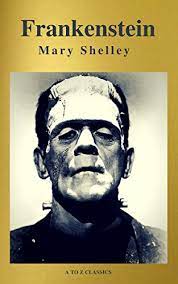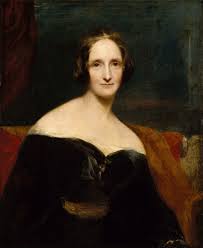Frankenstein Page #14
Frankenstein; or, The Modern Prometheus is an 1818 novel written by English author Mary Shelley. Frankenstein tells the story of Victor Frankenstein, a young scientist who creates a sapient creature in an unorthodox scientific experiment
“You have guessed right; I have lately been so deeply engaged in one occupation that I have not allowed myself sufficient rest, as you see; but I hope, I sincerely hope, that all these employments are now at an end and that I am at length free.” I trembled excessively; I could not endure to think of, and far less to allude to, the occurrences of the preceding night. I walked with a quick pace, and we soon arrived at my college. I then reflected, and the thought made me shiver, that the creature whom I had left in my apartment might still be there, alive and walking about. I dreaded to behold this monster, but I feared still more that Henry should see him. Entreating him, therefore, to remain a few minutes at the bottom of the stairs, I darted up towards my own room. My hand was already on the lock of the door before I recollected myself. I then paused, and a cold shivering came over me. I threw the door forcibly open, as children are accustomed to do when they expect a spectre to stand in waiting for them on the other side; but nothing appeared. I stepped fearfully in: the apartment was empty, and my bedroom was also freed from its hideous guest. I could hardly believe that so great a good fortune could have befallen me, but when I became assured that my enemy had indeed fled, I clapped my hands for joy and ran down to Clerval. We ascended into my room, and the servant presently brought breakfast; but I was unable to contain myself. It was not joy only that possessed me; I felt my flesh tingle with excess of sensitiveness, and my pulse beat rapidly. I was unable to remain for a single instant in the same place; I jumped over the chairs, clapped my hands, and laughed aloud. Clerval at first attributed my unusual spirits to joy on his arrival, but when he observed me more attentively, he saw a wildness in my eyes for which he could not account, and my loud, unrestrained, heartless laughter frightened and astonished him. “My dear Victor,” cried he, “what, for God’s sake, is the matter? Do not laugh in that manner. How ill you are! What is the cause of all this?” “Do not ask me,” cried I, putting my hands before my eyes, for I thought I saw the dreaded spectre glide into the room; “he can tell. Oh, save me! Save me!” I imagined that the monster seized me; I struggled furiously and fell down in a fit. Poor Clerval! What must have been his feelings? A meeting, which he anticipated with such joy, so strangely turned to bitterness. But I was not the witness of his grief, for I was lifeless and did not recover my senses for a long, long time. This was the commencement of a nervous fever which confined me for several months. During all that time Henry was my only nurse. I afterwards learned that, knowing my father’s advanced age and unfitness for so long a journey, and how wretched my sickness would make Elizabeth, he spared them this grief by concealing the extent of my disorder. He knew that I could not have a more kind and attentive nurse than himself; and, firm in the hope he felt of my recovery, he did not doubt that, instead of doing harm, he performed the kindest action that he could towards them. But I was in reality very ill, and surely nothing but the unbounded and unremitting attentions of my friend could have restored me to life. The form of the monster on whom I had bestowed existence was for ever before my eyes, and I raved incessantly concerning him. Doubtless my words surprised Henry; he at first believed them to be the wanderings of my disturbed imagination, but the pertinacity with which I continually recurred to the same subject persuaded him that my disorder indeed owed its origin to some uncommon and terrible event. By very slow degrees, and with frequent relapses that alarmed and grieved my friend, I recovered. I remember the first time I became capable of observing outward objects with any kind of pleasure, I perceived that the fallen leaves had disappeared and that the young buds were shooting forth from the trees that shaded my window. It was a divine spring, and the season contributed greatly to my convalescence. I felt also sentiments of joy and affection revive in my bosom; my gloom disappeared, and in a short time I became as cheerful as before I was attacked by the fatal passion. “Dearest Clerval,” exclaimed I, “how kind, how very good you are to me. This whole winter, instead of being spent in study, as you promised yourself, has been consumed in my sick room. How shall I ever repay you? I feel the greatest remorse for the disappointment of which I have been the occasion, but you will forgive me.” “You will repay me entirely if you do not discompose yourself, but get well as fast as you can; and since you appear in such good spirits, I may speak to you on one subject, may I not?” I trembled. One subject! What could it be? Could he allude to an object on whom I dared not even think? “Compose yourself,” said Clerval, who observed my change of colour, “I will not mention it if it agitates you; but your father and cousin would be very happy if they received a letter from you in your own handwriting. They hardly know how ill you have been and are uneasy at your long silence.” “Is that all, my dear Henry? How could you suppose that my first thought would not fly towards those dear, dear friends whom I love and who are so deserving of my love?” “If this is your present temper, my friend, you will perhaps be glad to see a letter that has been lying here some days for you; it is from your cousin, I believe.” Chapter 6 Clerval then put the following letter into my hands. It was from my own Elizabeth: “My dearest Cousin, “You have been ill, very ill, and even the constant letters of dear kind Henry are not sufficient to reassure me on your account. You are forbidden to write—to hold a pen; yet one word from you, dear Victor, is necessary to calm our apprehensions. For a long time I have thought that each post would bring this line, and my persuasions have restrained my uncle from undertaking a journey to Ingolstadt. I have prevented his encountering the inconveniences and perhaps dangers of so long a journey, yet how often have I regretted not being able to perform it myself! I figure to myself that the task of attending on your sickbed has devolved on some mercenary old nurse, who could never guess your wishes nor minister to them with the care and affection of your poor cousin. Yet that is over now: Clerval writes that indeed you are getting better. I eagerly hope that you will confirm this intelligence soon in your own handwriting. “Get well—and return to us. You will find a happy, cheerful home and friends who love you dearly. Your father’s health is vigorous, and he asks but to see you, but to be assured that you are well; and not a care will ever cloud his benevolent countenance. How pleased you would be to remark the improvement of our Ernest! He is now sixteen and full of activity and spirit. He is desirous to be a true Swiss and to enter into foreign service, but we cannot part with him, at least until his elder brother returns to us. My uncle is not pleased with the idea of a military career in a distant country, but Ernest never had your powers of application. He looks upon study as an odious fetter; his time is spent in the open air, climbing the hills or rowing on the lake. I fear that he will become an idler unless we yield the point and permit him to enter on the profession which he has selected.
Translation
Translate and read this book in other languages:
Select another language:
- - Select -
- 简体中文 (Chinese - Simplified)
- 繁體中文 (Chinese - Traditional)
- Español (Spanish)
- Esperanto (Esperanto)
- 日本語 (Japanese)
- Português (Portuguese)
- Deutsch (German)
- العربية (Arabic)
- Français (French)
- Русский (Russian)
- ಕನ್ನಡ (Kannada)
- 한국어 (Korean)
- עברית (Hebrew)
- Gaeilge (Irish)
- Українська (Ukrainian)
- اردو (Urdu)
- Magyar (Hungarian)
- मानक हिन्दी (Hindi)
- Indonesia (Indonesian)
- Italiano (Italian)
- தமிழ் (Tamil)
- Türkçe (Turkish)
- తెలుగు (Telugu)
- ภาษาไทย (Thai)
- Tiếng Việt (Vietnamese)
- Čeština (Czech)
- Polski (Polish)
- Bahasa Indonesia (Indonesian)
- Românește (Romanian)
- Nederlands (Dutch)
- Ελληνικά (Greek)
- Latinum (Latin)
- Svenska (Swedish)
- Dansk (Danish)
- Suomi (Finnish)
- فارسی (Persian)
- ייִדיש (Yiddish)
- հայերեն (Armenian)
- Norsk (Norwegian)
- English (English)
Citation
Use the citation below to add this book to your bibliography:
Style:MLAChicagoAPA
"Frankenstein Books." Literature.com. STANDS4 LLC, 2025. Web. 22 Jan. 2025. <https://www.literature.com/book/frankenstein_1446>.




Discuss this Frankenstein book with the community:
Report Comment
We're doing our best to make sure our content is useful, accurate and safe.
If by any chance you spot an inappropriate comment while navigating through our website please use this form to let us know, and we'll take care of it shortly.
Attachment
You need to be logged in to favorite.
Log In